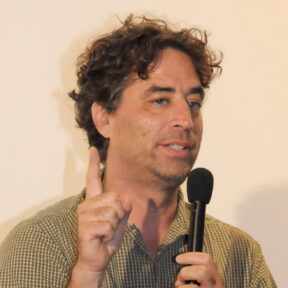
Michael Hardt
: Photo from Wikimedia Commons / Author of Photo: fabiogoveiaOverview
* Marxist writer and professor at Duke University
* Co-authored several books with Marxist sociologist and convicted terrorist Antonio Negri
* Endorsed the Not In Our Name project of C. Clark Kissinger’s Revolutionary Communist Party in 2002
* Was one of the so-called “Group of 88” professors who believed, wrongly, that members of the Duke University lacrosse team had beaten and raped a stripper during an off-campus party
* Supporter of the anti-capitalist Occupy Wall Street movement
Born in Washington, DC in 1960, Michael Hardt earned a degree in engineering from Swarthmore College in 1983. He subsequently worked for a number of solar energy companies and non-governmental organizations in Central America, which at the time was in upheaval due to a region-wide Soviet/Cuban-sponsored Communist insurrection. Hardt recalls a group of Salvadoran students telling him, at that time, that “what would really do us the most good is if you went back to the U.S.,” clandestinely established an “armed cell,” and “made revolution there.” “It was right in the middle of the Reagan years,” Hardt elaborates, “and I thought, ‘Oh, my God. They don’t realize how hard that is.’”
Hardt did in fact return to the United States to pursue whatever possibilities might exist for bringing social and political transformation. Selecting academia as his revolutionary staging ground, Hardt studied comparative literature at the University of Washington (earning an MA in 1986 and a Ph.D. in 1990) and went on to become a professor of literature and Italian studies at Duke University, where he developed a reputation as one of the foremost political philosophers and literary theorists on the Marxist Left.
Employing a writing style that he calls eclecticism—i.e., connecting the ideas of such thinkers as Karl Marx, Michel Foucault, Gilles Deleuze, Felix Guattari, and Antonio Gramsci—Hardt has repeatedly launched literary broadsides against capitalism and globalization. His most famous works—Empire (2000), Multitude (2004), and Commonwealth (2009)—were written in collaboration with the Italian Marxist sociologist and political philosopher Antonio Negri and became major additions to the field of critical theory.
In writing Empire, Hardt and Negri deliberately set out to produce a Communist Manifesto for the 21st century. Postulating that traditional imperialism and American dominance had been rendered obsolete after the Vietnam War, the authors stated that “imperialism as it was practiced mostly by the European powers from [the] eighteenth to the twentieth century is no longer the adequate model of global domination”; that “the imposition of a national sovereignty over foreign territories” by such countries as the U.S., Britain, France, and Germany could no longer “suffice for globalizing projects”; and that empires thenceforth would have to function “collaboratively” as “a network of powers” consisting not only of geographic entities but also “super-national organizations, even non-governmental organizations.”
The result of this trend, said Hardt and Negri, was “deterritorialization,” whereby distinct, nation-based identities gradually morph into hybrid identities scattered in various regions across the globe. They cited, with approval and agreement, Karl Marx’s assertion that capitalism, because of its inherent excesses, inevitably “will dig its own grave.” And they passionately promoted global citizenship, a guaranteed baseline income for all people, and the reappropriation of the means of production.
In a 2004 interview, Hardt accused the Bush administration of stubbornly trying to “reinvigorat[e] the old kind of imperialism: unilateralist control over other territories.” He condemned “the U.S. imperialist invader” that had attacked Iraq during the previous year, and urged Iraqis to wage “a national liberation struggle” against American aggression.
Also in 2004, Hardt and Negri’s second book, Multitude, suggested the need for a political party to represent the interests of numerous, clearly defined interest groups and voting blocs—e.g., blacks, Hispanics, women, homosexuals, prisoners, senior citizens, young people, and the poor. Such a party, Hardt explained, could gain great influence by engaging in raw identity politics.
The third installment of the Hardt-Negri trilogy, Commonwealth, serves as an encomium to Communism. Rejecting the concept of private property, the authors propose that the “common wealth” of both the human and natural worlds should belong to all people collectively. The book is particularly harsh in its assessment of the traditional family, which it describes as a “pathetic” institution, a “machine” that “grinds down and crushes the common” with “the blindest egoism.” “Down with the family!” Hardt and Negri exclaim. Commonwealth goes on to predict that the family, as an institution, will be permanently vaporized—along with all corporations and sovereign nations—when the revolutionary multitude finally succeeds in seizing “control of the means of production and reproduction” and creating a new world order founded on global rather than parochial citizenship.
In 2002, Hardt was an endorser of Not In Our Name (NION), an anti-war project of C. Clark Kissinger‘s Revolutionary Communist Party. To view a list of fellow endorsers, click here.
In 2006 Hardt was one of the so-called “Group of 88” professors who—when a black stripper accused three white members of the Duke University lacrosse team of having beaten and raped her during an off-campus party—signed a letter attacking the suspects and published a full-page statement lamenting the “racism and sexism” that purportedly tormented so many students at Duke. It later became evident that the plaintiff’s allegations were entirely fabricated, and all charges against the defendants were dropped.
In October 2011 Hardt wrote an article praising the anti-capitalist Occupy Wall Street (OWS) movement for “giv[ing] voice” to a widespread sense of “indignation against corporate greed and economic inequality.” Suggesting, further, that “the representational political system … generally is inadequate,” Hardt speculated that “this [OWS] protest movement could, and perhaps must, transform into a genuine, democratic constituent process.” In May 2012 Hardt and Antonio Negri self-published Declaration, an electronic pamphlet about OWS.
For additional information on Michael Hardt, click here.